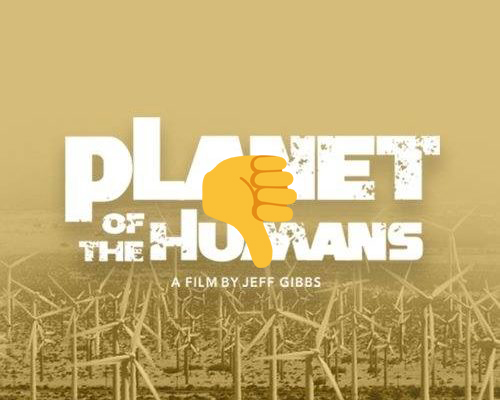
Written by: Aidan Nolan, Development Officer
Responding to “Planet of the Humans” or “Thanos Environmentalism,” a film directed by Jeff Gibbs with executive producer Michael Moore.
Writing this blog has been very difficult. Critiquing those you admire, particularly when they are wrong, is never easy.
I’ve been a fan of Michael Moore’s films for a long time. I was in my final year of high school when the awful school shooting happened at Columbine High School in Colorado killing 15 people. I appreciated the way Moore contextualized that event within the broader mosaic of American history, politics and gun policy. I admired his work in films like “Bowling for Columbine”, “Roger and Me”, and “Farenheit 911” because he fought for the little guy, and as a left-leaning humanities student at university these films shaped my growing interest in political advocacy through film, television, and theatre; and that interest has played a major role in shaping my career as I near middle age.
So, when I heard in February that Moore had acted as an executive producer on a film that was being widely panned by well known environmentalists like Emmy Award winning “GASLAND” director Josh Fox, I was both taken aback and curious. Then COVID-19 hit, and watching the film dropped down my priority list, until recently, when I had a free evening. What I saw, unfortunately, was very disappointing.
“Planet of the Humans” directed by Jeff Gibbs, in style it’s very much in the Moore vain of documentary storytelling through anecdotal interviews, montages juxtaposing images and sound to lay bear the hypocrisy of powerful people, animated storytelling and graphs, along with a persistent critique of capitalism as the cause of many of the social, environmental, and economic problems affecting the world today.
However, that Moore would produce a film that so plainly gets the facts wrong on renewable energy while also offering no solutions to the climate crisis of its own – beyond a tacit endorsement of population control from a slew of old white talking heads – was truly upsetting.
The basic premise of the film, as set out by Gibbs, is that we’ve been lied to about renewable energy and that the crisis of climate change is unsolvable unless there is a dramatic drop in consumption as a result of a drop in population. The questions posed in the opening minute, “How long will humans be around?”, “Will we know when it’s our time?” is Malthusian in its outlook, or, for those unfamiliar with the work of Thomas Malthus, bears a striking closeness to the thinking of the character “Thanos” in Marvel’s 2018 “Avengers” movie series. The evil Thanos captures all the magical “infinity stones”, so that he can reduce the population of the universe by 50% thereby ensuring that there are more resources for everyone.

‘Avengers: Infinity War’ © 2018 Marvel Studios.
According to Gibbs, we were told that if we just made the switch to renewable energy, that this would be enough to stop climate change and maintain our lifestyles and levels of consumption. But, Gibbs argues, renewable energy isn’t making the world greener, and powerful corporations are only investing in renewable energy projects because it both helps them clean up their public image and improve their balance sheets.
He makes this argument through interviews with conservationists opposing a particular wind farm in Vermont, a solar technician who describes how inefficient the panels are at his particular facility in Michigan, an examination of large-scale solar installations in California that also use natural gas, and an examination of biofuels’ inclusion in the renewables sector. Gibbs also outlines how some environmental groups have been receiving money from polluters and how this may have changed their political messaging around certain sectors and projects. And, while I am sympathetic to his concerns with regards to corporations using renewables and environmental NGOs to clean their image and maintain the economic dominance of their CEOs and shareholders, I was truly shocked with the lack of critical thinking this film displayed.
In a mid-film montage of grey-haired white authors and academics, the phrase “too many human beings using too much” stuck out to me as resembling Gibbs’ view of the problem – and also, his first misconception of it. The problem isn’t that “too many human beings are using too much”, the problem is that wealthy countries refuse to lead the way in reducing emissions. For example, when looking at per capita CO2 emissions, the average Canadian emits 15.1 metric tonnes of CO2 annually, while the average Indian emits 1.7 metric tonnes, and though some might explain part of this difference by arguing that Canada is a Northern country, Australia’s emissions per capita are even higher at 15.4 and Sweden’s sit at 4.5 metric tonnes (World Bank, Oct, 2017). To put this in perspective, the global emissions average is 4.5 metric tonnes per person, and the suggested goal to keep global temperature rise at or below 2 degrees Celsius is 4.0 metric tonnes per person. As such, the problem is clearly one based on the emissions of a few; driven by consumption yes, but population is less of a factor in that consumption than suggested by Gibbs.
Additionally, Gibbs’ assertion that we were told that all we had to do to solve the climate crisis is switch to renewable energy, seems absurd. No climate scientist, environmental organization or government that I am aware of supports this view, nor does the broader environmental community. But switching to renewables is a critical step, along with changing how we heat and cool our buildings, our land use patterns, and massive investments in infrastructure and education. To get a sense of the extent of the changes to our society that scientists are suggesting, visit “Project Drawdown” at drawdown.org.
Finally, the interviews that Gibbs uses in the film are cherry picked from some of the worst examples of renewable energy projects. For instance, the wind project in Vermont was visually similar to coal mining mountain top removal projects in Appalachia, and this imagery was used to draw a false equivalence between wind energy and coal, not only ignoring the difference in emissions between the two industries, but also differences between wind energy projects themselves. In terms of the solar project examples offered, Gibbs shared no figures comparing a natural gas integrated solar facility with a regular natural gas facility, nor did he describe the amazing advances in solar technology that have improved its efficiency far beyond the levels presented by the solar technician in Michigan. Instead, solar energy is dismissed as he argues that petroleum is used in the production of solar panels and they are therefore part of the problem, ignoring the fact that this too is changing quickly. And with regards to biofuels, Gibbs’ critique that biofuels just substitute burning oil for burning food and forests, is also overly simplified as it ignores the environmental benefits of burning liquified natural gas produced from the methane coming off our compost. This process actually reduces our methane emissions as these gases are not left to seep out over time from organic waste in landfills.
Gibbs made these and other mistakes throughout the film, and his cherry picking of data was obvious to me as someone who works in the field of renewables, but it may not be as obvious to others, and while my voice may not be as loud as that of Josh Fox and others, I will join them in asking Gibbs and Moore to retract the film immediately as it does a great disservice to the ongoing work of many scientists and activists who would like to save the planet without a Thanos level event.
To learn more about how we can use renewables to meet our energy needs and get off fossil fuels, keep up with our work here at Relay, and if you are able please support our work through a donation to make sure we are educating the next generation of green energy leaders.

